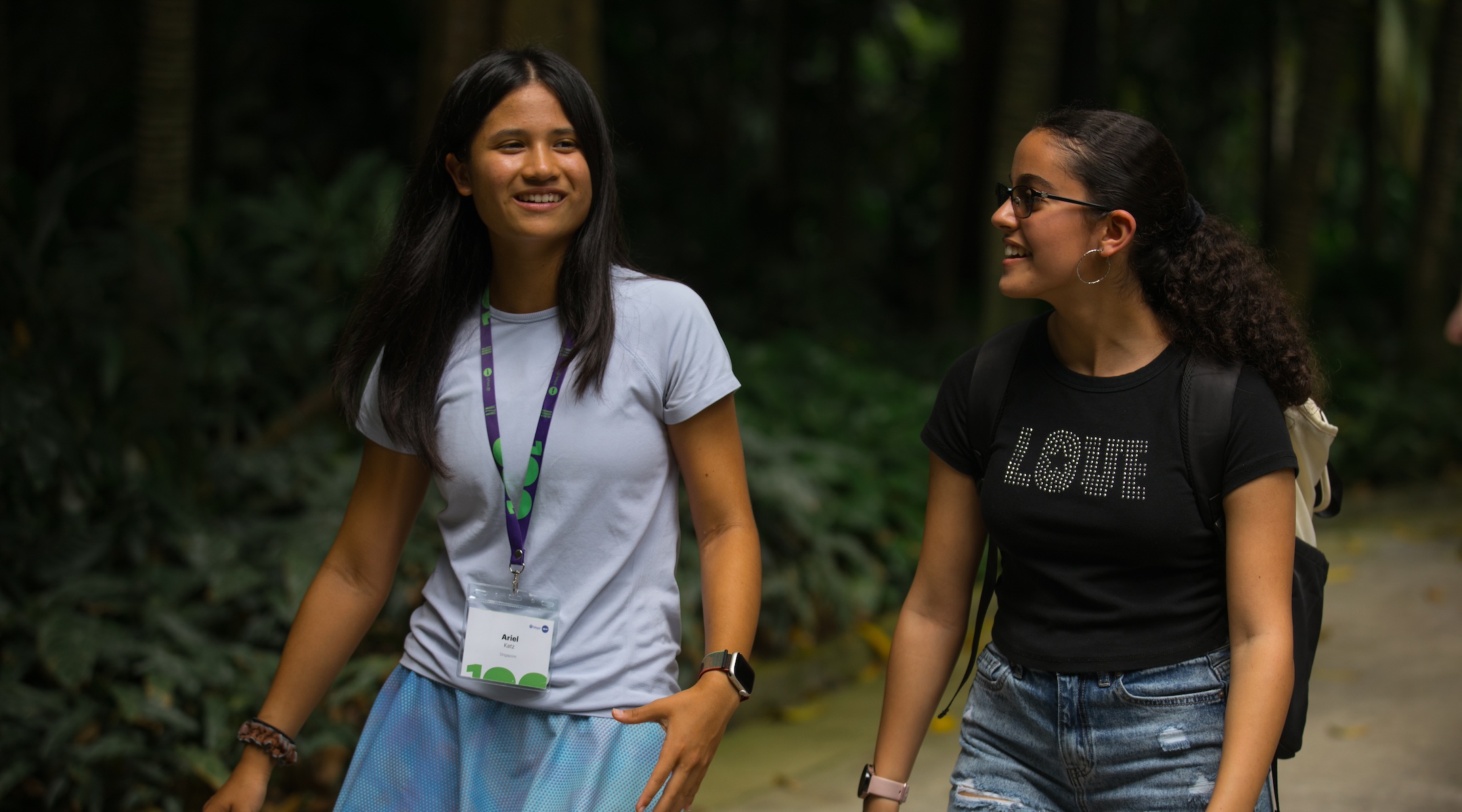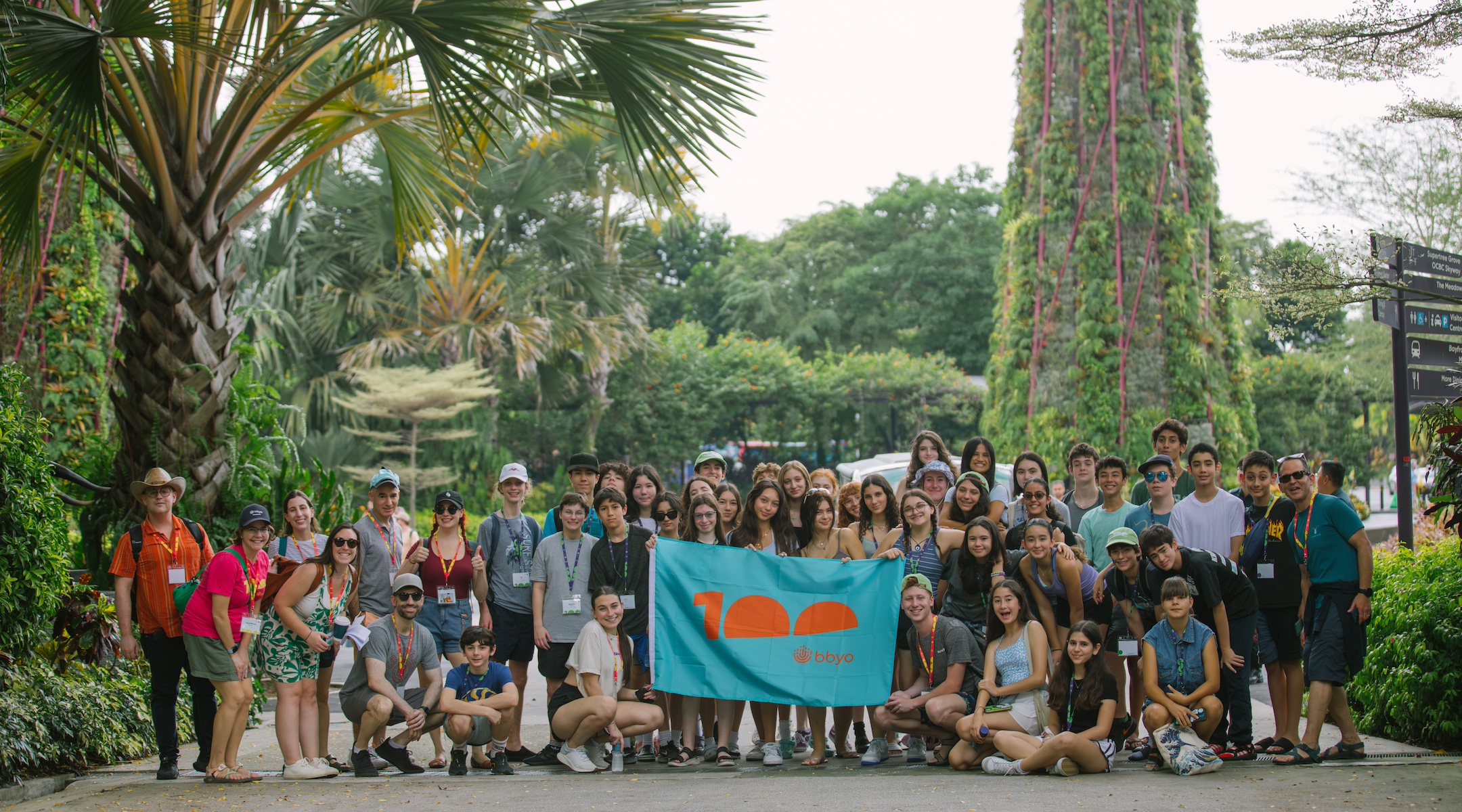For Jewish teens in Asia, first BBYO convention in Singapore offers a rare sense of community
Teens went home with strategies to build youth movements in their own countries

About 40 teens attended the conference in mid-November 2023. (Courtesy of BBYO)
TAIPEI (JTA) — For a few years eight decades ago, Shanghai was home to an outpost of what would become BBYO, the global Jewish youth movement.
At the time, the Chinese city was a refuge for Jews fleeing Europe. Fifteen German Jewish teens created an Aleph Zadik Aleph chapter in June 1941, but when they left Asia after the war, the youth movement ended, too.
Now, the network of small but significant Jewish communities scattered across Asia has resurrected BBYO’s presence on the continent. About 40 teens attended the group’s conference in Singapore last week.
Over four days, they explored the city with their peers while learning how to launch their own BBYO chapters, host events and foster a sustainable community among Jewish teens in their own cities.
The event drew teens and lay leaders from Singapore, Taipei, Tokyo, Beijing, Shanghai and Hong Kong who otherwise would rarely have the opportunity to interact with one another and whose home communities have too few teens to mount much in the way of their own programming.
“The communities are small and they don’t get a lot of the experiences available in the U.S.,” said Ryan Ladd, BBYO’s senior manager of digital strategy, who is based in Washington, D.C. “So this is an opportunity to level the playing field to make sure they have these Jewish experiences.”
Asia can be a lonely place to grow up as a Jewish teen. Most are “third-culture kids,” meaning that they are being raised in a culture that is not their parents’, and while many come from diverse or international backgrounds, they’re often the only Jews in their classrooms or schools.
The best part of the weekend for Emma Brownstein, a 13-year-old member of the Tokyo Jewish Community, was getting the opportunity to connect with other Jews from across Asia. She goes to an international school in Tokyo, where she knows a few other Jews, but being immersed in a large group her age was “really a new experience for me.”
Participants explored some of Singapore’s most famous sites like the Jewel Changi Airport and the Gardens by the Bay while participating in team-building exercises, community building workshops and discussions about their Asian Jewish identities. During a “Taste of Asia” oneg on Friday night, delegations shared some of their cities’ trademark snacks.
“I think the trip really highlighted the importance of friendships and branching out and going out of your comfort zone to socialize with other people,” Brownstein told JTA. “This was definitely a once-in-a-lifetime thing, especially in Asia, where there’s not many other Jews.”

(Courtesy of BBYO)
The convention’s programming reflected an explicit goal of forming and strengthening local BBYO chapters in Asian cities. Workshops on leadership, understanding one’s own community and dreaming up activities that would engage fellow teens at home all aimed to ensure that the convention would not be a one-off event.
It was a vision that leaders of AZA — which became BBYO in 1944 when B’nai Brith, then the fraternity’s partner, launched a girls division — first outlined back in 1941. “You have seen displayed before you more than the mere installation of a set of new officers – You have seen more than the mere unfurling of the Aleph Zadik Aleph banner in the Far East,” an officer wrote in article in “The Shofar,” BBYO’s newspaper, at the time about the Shanghai chapter. “You have actually been present at the setting up of a new and vital milestone in the history of Far Eastern Jewry.”
That milestone period came to a close at the end of World War II, when most Jewish refugees in Shanghai departed for America, Israel, Australia and other countries. BBYO again had no presence in Asia until 2017, when a chapter opened again in Shanghai. Other chapters opened in Singapore and Tokyo in 2021. Now ones are anticipated in Hong Kong, Taipei, and Beijing following the convention.
Rabbi Martha Bergadine, the education and programming coordinator for the United Jewish Congregation of Hong Kong — a progressive community of about 130 families, with about 20 total teens — says the six teens who attended the convention this weekend are already working to plan their first activity.
“It seems that the Jewish communities of Asia are at a point of becoming more established and more rooted,” Bergadine said. “And I think in that sort of evolution, programmatic offerings get richer … this is going to be a key part of going forward, to provide these opportunities to the teens.”
This article originally appeared on JTA.org.















